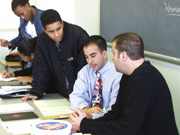The Hoboken Chamber of Commerce and local business owners have partnered with the Hoboken School District to create its first ever Junior Achievement program, which, according to officials, will educate and inspire young people to value free enterprise and improve the quality of their lives through business and economics.
Joe Falzarano, who owns Big Fun Toys on Washington Street and is a member of the Chamber of Commerce, is one of more 113,000 volunteers worldwide who go into the classroom to teach Junior Achievement.
"This is something that has never been done in Hoboken," said Falzarano in a recent interview. "[Junior Achievement] offers these students an excellent opportunity to become entrepreneurs and start their own business."
Falzarano added that businesses support Junior Achievement because its programs teach students the importance of education and its relevance to the workplace. In addition, sponsoring a school is a great way for businesses to be involved and recognized within the community.
Junior Achievement began in 1919 as a collection of small after-school business clubs for students in Springfield, Mass. It was founded by Massachusetts industrialist Horace Moses, president of AT&T Theodore Vail, and Sen. Murray Crane of Massachusetts. Students formed a company then produced and marketed a product. They were financed through donations made by local business organizations and foundations.
Now, Junior Achievement is the world’s largest organization dedicated to educating young people about business, economics, and free enterprise. Junior Achievement programs are taught by volunteers in class and after school at locations throughout the United States and in nearly 100 countries. In all, Junior Achievement programs are taught in more than 175,000 classrooms.
Seniors in Hoboken High School Teacher Michael Ben-David’s economics class are participating in the Junior Achievement’s "Company Program." This activity-based curriculum replaces the dry and difficult high school economics class. Students learn economics concepts and then have the opportunity to apply them by actually running their own student company.
This semester course is taught by the classroom teacher, but a volunteer consultant comes in each Tuesday with activities to illustrate the concepts being taught by the teacher.
According to Falzarano, the course teaches students important topics such as management, productivity, profit, negotiating, problem solving, research, selling, and teamwork.
A Dance in March
To show what they have learned, the class has chosen to plan and execute at a dance club event that is tentatively scheduled for March at the high school gymnasium. Their goal is to earn enough money so that that all the students in the Junior Achievement class can pay for tickets to their prom, which will come at the end of the year, at around $100 per ticket.
While Ben-David and Falzarano are there to give advice, it is up to the students to make their idea work. They are responsible for electing officers, gaining permission from the principal to hold the March dance, raising capital to fund the dance, marketing, advertising, selling tickets, and production, which includes selecting food and drinks, a DJ, and security.
One of the topics of last Tuesday’s class was the status of a student-run raffle to raise money. The students lobbied local businesses to donate tickets to area professional sports events, like the Nets and Giants, and the tickets will be raffled off as prizes. In just a couple of short weeks, the class has raised over $1,600 and hopes to increase that number in the days to come.
After the discussion of the raffle ended, the class separated into groups to discuss different aspects of the dance. Huddled in one corner, co-presidents Zoreida Serrano and Latrenda Thomas were discussing the pitch they will make to Hoboken High Principal John Lavagnino. "I’m pretty nervous about it," said Serrano about the pending presentation. "It’s a lot of pressure."
She added that the Junior Achievement project has really opened her eyes to how the business world works.
"This is my first time doing anything like this, and I had no idea about how much work is involved," said Serrano. She added that when the class first decided on the idea of a dance, she thought it could be organized in the matter of just a few classes, but now she realized that there are many levels of minutiae involved in business.
Ben-David said that Junior Achievement is an effective program because the students actually have a stake in what they are doing and will benefit financially if they are successful.
"It’s hands-on economics," said Ben-David. "These seniors are biting at the bit out there, and programs like this one help them make that transition and teach them what the business world is really like."
